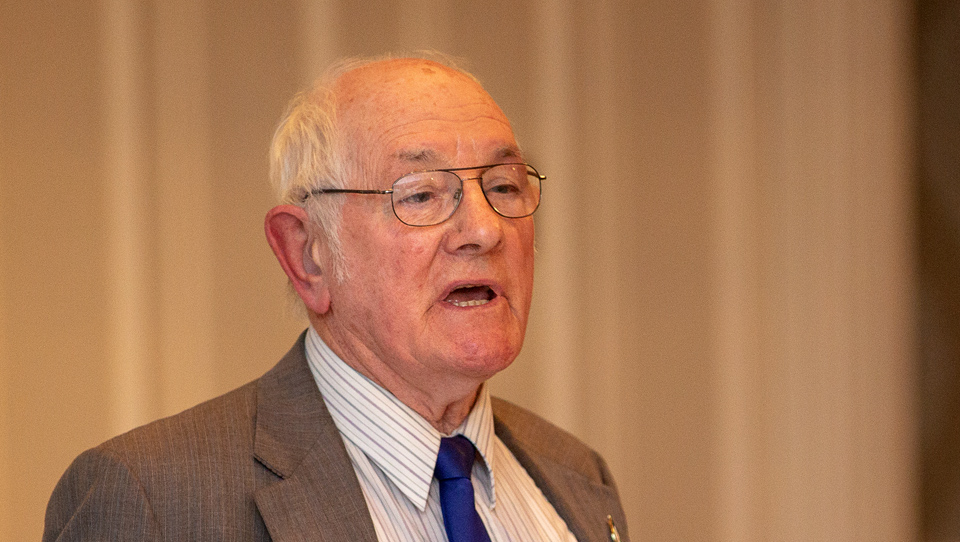The communications were usually in the form of tiny notes, sometimes written on toilet paper, and inscribed with cramped and miniscule writing before being smuggled out of the prison.
 |
| Richard Behal, pictured, who had hundreds of comms, poems and letters since 1983. He is giving them to the History department of the University of Limerick to be catalogued and preserved |
Coincidentally, on the same day that controversy arose – the anniversary of Bobby Sands death on hunger strike on May 5, 1981 – another valuable source of republican history was revealed.
Veteran republican, Richard Behal, who was in charge of the republican movement’s foreign affairs bureau at the time of the hunger strikes, has decided to hand over a substantial number of documents including comms sent out from the H Blocks during the blanket protest that had preceded the hunger strikes.
Behal, who is originally from Kilkenny and was one of the foremost republican activists of the mid 1960s, says that he found the comms among other items that were left out in refuse bags at the Sinn Féin offices on Parnell Square, Dublin in 1982.
He is not claiming that they were deliberately left to be destroyed, but Sinn Féin’s carelessness with the comms – which include letters from Bobby Sands – underlines the importance of the proper care of historical documents. Indeed, it is quite possible that whoever did put them into bags might not have realised how such material contributes to later understanding of the period.
The documents which Richard Behal has cared for could prove to be another valuable addition to the history of the time as a huge amount of primary material related to the republican movement has been lost, or hidden, over the years. The controversy over Bobby Sands funeral underlines the need for all of this material to be catalogued and made available as soon as possible.
Richard Behal says he is handing over his archive to the University of Limerick and hopefully, the institution will realise the importance of what they have been given, and ensure that no-one imposes lengthy time limits on their being accessible to researchers. Unfortunately, as appears to be the case with other tranches of material from this time, some republican primary source material is basically being hoarded for all manner of personal and political reasons.
Behal is to be commended for his having rescued the material in his possession, and his gesture needs to be recognised for the important contribution it may make to an understanding of what happened in those times.
It is to be hoped that this material will be catalogued quickly and made fully available to researchers. The controversy over the H Block comms is rooted in the fact that no-one is exactly certain what had been handed over, or why originals appear to have been transcribed and redacted.
Such practices are common enough, for example state deposits will often redact names for a certain period, but there would appear to be no valid reason why 40 years later the full communications between the IRA prisoners in the H Blocks and the leadership outside the jail ought not be made publicly available.
Veteran republican, Richard Behal, who was in charge of the republican movement’s foreign affairs bureau at the time of the hunger strikes, has decided to hand over a substantial number of documents including comms sent out from the H Blocks during the blanket protest that had preceded the hunger strikes.
Behal, who is originally from Kilkenny and was one of the foremost republican activists of the mid 1960s, says that he found the comms among other items that were left out in refuse bags at the Sinn Féin offices on Parnell Square, Dublin in 1982.
He is not claiming that they were deliberately left to be destroyed, but Sinn Féin’s carelessness with the comms – which include letters from Bobby Sands – underlines the importance of the proper care of historical documents. Indeed, it is quite possible that whoever did put them into bags might not have realised how such material contributes to later understanding of the period.
The documents which Richard Behal has cared for could prove to be another valuable addition to the history of the time as a huge amount of primary material related to the republican movement has been lost, or hidden, over the years. The controversy over Bobby Sands funeral underlines the need for all of this material to be catalogued and made available as soon as possible.
Richard Behal says he is handing over his archive to the University of Limerick and hopefully, the institution will realise the importance of what they have been given, and ensure that no-one imposes lengthy time limits on their being accessible to researchers. Unfortunately, as appears to be the case with other tranches of material from this time, some republican primary source material is basically being hoarded for all manner of personal and political reasons.
Behal is to be commended for his having rescued the material in his possession, and his gesture needs to be recognised for the important contribution it may make to an understanding of what happened in those times.
It is to be hoped that this material will be catalogued quickly and made fully available to researchers. The controversy over the H Block comms is rooted in the fact that no-one is exactly certain what had been handed over, or why originals appear to have been transcribed and redacted.
Such practices are common enough, for example state deposits will often redact names for a certain period, but there would appear to be no valid reason why 40 years later the full communications between the IRA prisoners in the H Blocks and the leadership outside the jail ought not be made publicly available.








No comments